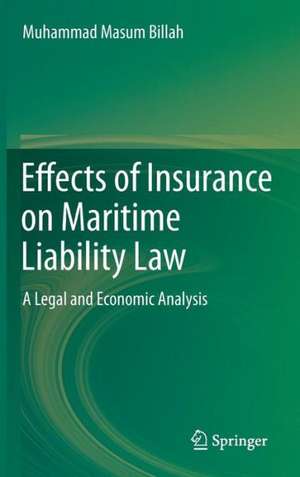Effects of Insurance on Maritime Liability Law: A Legal and Economic Analysis
Autor Muhammad Masum Billahen Limba Engleză Hardback – 20 ian 2014
| Toate formatele și edițiile | Preț | Express |
|---|---|---|
| Paperback (1) | 628.03 lei 39-44 zile | |
| Springer International Publishing – 23 aug 2016 | 628.03 lei 39-44 zile | |
| Hardback (1) | 1110.72 lei 6-8 săpt. | |
| Springer International Publishing – 20 ian 2014 | 1110.72 lei 6-8 săpt. |
Preț: 1110.72 lei
Preț vechi: 1354.54 lei
-18% Nou
Puncte Express: 1666
Preț estimativ în valută:
212.59€ • 221.10$ • 178.15£
212.59€ • 221.10$ • 178.15£
Carte tipărită la comandă
Livrare economică 13-27 martie
Preluare comenzi: 021 569.72.76
Specificații
ISBN-13: 9783319034874
ISBN-10: 3319034871
Pagini: 228
Ilustrații: XV, 210 p.
Dimensiuni: 155 x 235 x 20 mm
Greutate: 0.5 kg
Ediția:2014
Editura: Springer International Publishing
Colecția Springer
Locul publicării:Cham, Switzerland
ISBN-10: 3319034871
Pagini: 228
Ilustrații: XV, 210 p.
Dimensiuni: 155 x 235 x 20 mm
Greutate: 0.5 kg
Ediția:2014
Editura: Springer International Publishing
Colecția Springer
Locul publicării:Cham, Switzerland
Public țintă
ResearchCuprins
1. Introduction.- 2. Lack of Insurance and Its Effect on Maritime Liability Law: A Historical Evaluation.- 3. Insurance and Limitation of Ship owners’ Liability: An Economic Analysis.- 4. Insurance through General Average: Its Justifications and Effects on Optimal Care and on Social Costs.- 5. Maritime Cargo Liability Regimes in Light of Insurance Realities.- 6. Role of Insurance in Providing Adequate Compensation for Oil Pollution Damage and in Reducing Oil Pollution Incidents.- 7. Incentive Effect of Liability Rules in the Presence of Liability Insurance.- 8. Conclusion.
Textul de pe ultima copertă
The book examines how the absence of insurance in the past led to some special maritime liability law principles such as ‘general average’ (i.e., losses or expenses shared by all the parties to a maritime adventure) and the limitation of shipowners’ liability. In the absence of insurance, these principles served the function of insurance mostly for shipowners. As commercial marine insurance is now widely available, these principles have lost their justification and may in fact interfere with the most important goal of liability law i.e., deterrence from negligence. The work thus recommends their abolition. It further argues that when insurance is easily available and affordable to the both parties to a liability claim, the main goal of liability law should be deterrence as opposed to compensation. This is exactly the case with the maritime cargo liability claims where both cargo owners and shipowners are invariably insured. As a result, the sole focus of cargo liability law should be and to a great extent, is deterrence. On the other hand, in the vessel-source oil pollution liability setting, pollution victims are not usually insured. Therefore, oil pollution liability law has to cater both for compensation and deterrence, the two traditional goals of liability law. The final question the work addresses is whether the deterrent effect of liability law is affected by the availability of liability insurance. Contrary to the popular belief the work attempts to prove that the presence of liability insurance is not necessarily a hindrance but can be a complementary force towards the realization of deterrent goal of liability law.
Caracteristici
First examination of maritime liability law using a formal economic analysis approach Explores the connection between insurance and maritime liability law Argues that liability insurance is not a hindrance but a complementary force towards achieving the deterrent goal of liability law Includes supplementary material: sn.pub/extras












